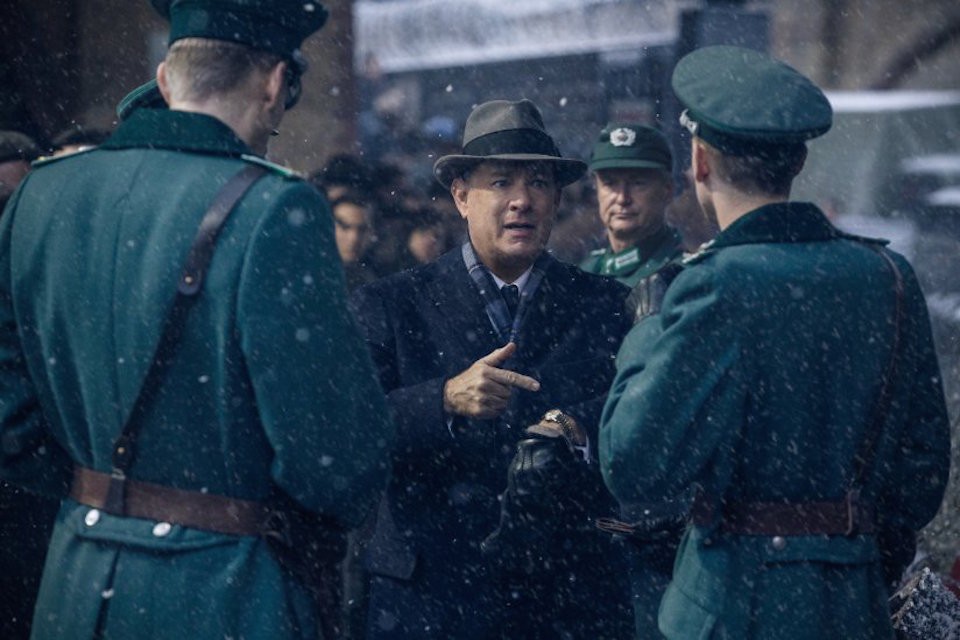NOVEMBER 23, 2015
The opening scene of Steven Spielberg’s “Bridge of Spies” features a stunning shot that sets up the entire film. Soviet spy Rudolf Abel (Mark Rylance) likes to paint in his spare time, and Spielberg places Abel in the center of the frame, with his image reflected in a mirror on the left and his own painted self-portrait on the right. Which one is real? It’s a perfect metaphor for the many identities that a spy has to assume in the world of the Cold War and sets the tone for the film to come.
It’s easy to take Steven Spielberg for granted. He’s STEVEN SPIELBERG for goodness sakes, an icon of the film industry and the rare film director who is a household name all over the world. But perhaps more than any other director working within the Hollywood studio system, Spielberg is a craftsman. He has the knack of assembling the best team of artists — the top cinematographers, the most talented composers, superb actors — all working together toward one goal. His films don’t always come together — I wouldn’t sit through “War Horse” again if you paid me — but you can always tell that they’re the vision of one man who cares that they are well made.
And “Bridge of Spies” is impeccably made.
Perhaps the key members of Spielberg’s team here are the writers, and in this case, he has attracted some terrific talent — Matt Charman who found the material and brought it to Dreamworks and then Joel and Ethan Coen, who punched up Charman’s script. The Coen brothers, who have won Oscars for producing, writing and directing but who rarely write films for other directors, have honed the film into a two-act play of sorts, and their fingerprints are all over it, particularly in the crackling first act.
That begins in 1957, when Abel is arrested for being a Soviet spy, and James Donovan (Tom Hanks, in top form in his Jimmy Stewart mode), a highly-regarded insurance lawyer, is unexpectedly asked to provide Abel with a defense that appears to be fair. Though the outcome of the trial is a foregone conclusion, Donovan gives Abel a surprisingly strong defense which shocks the American people and causes his wife Mary (a wonderful Amy Ryan) and his family to be ostracized. After Abel is is convicted, Donovan successfully pleads with Judge Mortimer Byers (the great stage actor Dakin Matthews, who’s terrific here) to spare Abel’s life, arguing that Abel may one day become a useful tool in a spy swap should an American spy ever be captured by the Soviets.
Donovan’s prescience pays off in 1960 when an American pilot of a U-2 spy plane, Francis Gary Powers (Austin Stowell), is shot down over the Soviet Union and captured. The Soviets send a backchannel message to Donovan indicating that they’re interested in a spy exchange. At the same time, American economics student Frederic Pryor (Will Rogers) is caught behind the wall in East Berlin and is also held prisoner. Donovan flies into Berlin to negotiate the release of both men, and once again the insurance attorney is placed in the center of world events.
Act 2, where the focus is on the prisoner negotiations, is fine, but Powers is presented as a pretty bland flyboy, and Stowell does little to help perk things up. The real meat of the film is Act 1 with the remarkable acting pas de deux by Hanks and Rylance.
Though he appeared on Broadway a few years ago, Hanks is primarily known as an actor most at home in front of the camera. Rylance, however, is considered one of the finest stage actors of his generation with 3 Tony Awards under his belt, and though he received a much-deserved Emmy nomination this year for the PBS mini-series “Wolf Hall,” Rylance is definitely a creature of the stage. Watching these two actors at the very top of their game go at each other is enthralling, helped in no small measure by the Coens’ smart dialogue. The film sags a bit when Rylance disappears but when he and Hanks reunite on the bridge, your heart will soar.
The film is gorgeous looking, thanks to cinematographer Janusz Kaminski (who has won two Oscars for photographing Spielberg films) and there’s a lovely score by Thomas Newman (although almost everything he’s written lately reminds me of his theme to HBO’s “The Newsroom,” but that’s my problem, I guess.)
Although the films to which I most passionately respond tend to be those that upend genres or expectations, there is something to be said for the strength that Hollywood studio filmmaking can bring to a large-scale project, and that doesn’t mean that it can’t be considered art. Spielberg will likely be considered one day as a Hollywood legend (if he isn’t already), but when film historians begin to pick over his filmography as to why he is so highly regarded, “Bridge of Spies” will probably one of those they’ll examine closely.
GRADE: B+












